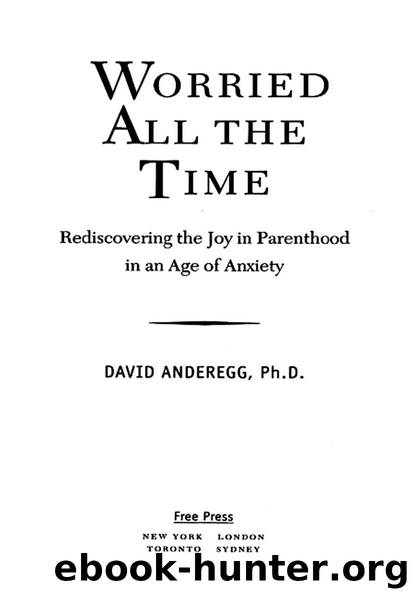Worried All the Time by David Anderegg

Author:David Anderegg
Language: eng
Format: epub
Publisher: Free Press
Published: 2004-07-15T00:00:00+00:00
It is bound to keep parents awake at night if they imagine, for some of these reasons, that the person looking after their baby or child is bad, or mean, or sadistic. But then there’s the reverse nightmare: what if the substitute caregiver is too good? What if my baby or child actually likes the substitute caregiver better than she likes me? Sometimes people who are insecure, and prone to feel unloved, cannot imagine that anyone else, including their baby, will love them either. For such a parent, a competent, experienced, wise baby-sitter is desired, and also deeply feared. This makes the whole thing ever so much harder; we want someone who will be good and attentive, but not too good. It’s like trying to throw a baseball through a half-open window: it requires calculation, and luck, and it s really not easy. If you overcorrect too much in either direction, the results can be disastrous.
Most parents with this worry do not really appreciate how mythically important mothers are to their children. Adults in therapy who have been raised by substitute caregivers will always tell stories of loving nannies or baby-sitters who really made a difference in their lives, but almost never, in my experience, did they prefer the substitute. Mothers are just as important in children’s mythic lives as children are in mothers’; there is something unique, undeniable, and primitive about children’s connections to their real mothers, no matter how good the substitute caregiving is or has been.
POSTSCRIPT: BRUTAL FANTASIES, BRUTAL FACTS
To some readers, the foregoing discussion might seem a little, well, hard. Could it be that so much parental worrying about substitute care comes from such dark places: An unspoken wish to save money by skimping on caregiver costs? The insecurities and self-doubts that lead us to feel that, in a cuddly contest with a caregiver, we will surely lose? If these fantasies seem a little dark, how about the brutal facts in these matters?
The Centers for Disease Control put out a little publication called the “Weekly Morbidity and Mortality Report,” which analyzes various trends in what makes all Americans unhealthy, or what kills us, and how. In the WMMR for March 8, 2002, the CDC reminded us that children are more likely to be murdered during the first year of life than at any other age until age seventeen. Most children who are killed in the first year of life are killed on the first day of life, and in approximately 90 percent of the cases, the perpetrators on record are the infants’ mothers. (Although the CDC doesn’t mention them, we can assume that a sizable portion of the remaining 10 percent might be the infants’ fathers.) There is another spike in infant homicide around the age of six to eight weeks, which researchers have noted corresponds to the peak amount of crying time in most infants’ lives.
The CDC also tells us that most mothers who kill their children are young and really scared, or mentally ill, or both.
Download
This site does not store any files on its server. We only index and link to content provided by other sites. Please contact the content providers to delete copyright contents if any and email us, we'll remove relevant links or contents immediately.
Rewire Your Anxious Brain by Catherine M. Pittman(18656)
Talking to Strangers by Malcolm Gladwell(13370)
The Art of Thinking Clearly by Rolf Dobelli(10489)
Mindhunter: Inside the FBI's Elite Serial Crime Unit by John E. Douglas & Mark Olshaker(9344)
Becoming Supernatural by Dr. Joe Dispenza(8217)
Change Your Questions, Change Your Life by Marilee Adams(7783)
Nudge - Improving Decisions about Health, Wealth, and Happiness by Thaler Sunstein(7709)
The Road Less Traveled by M. Scott Peck(7603)
The Lost Art of Listening by Michael P. Nichols(7506)
Mastermind: How to Think Like Sherlock Holmes by Maria Konnikova(7347)
Enlightenment Now: The Case for Reason, Science, Humanism, and Progress by Steven Pinker(7314)
Win Bigly by Scott Adams(7199)
The Way of Zen by Alan W. Watts(6614)
Daring Greatly by Brene Brown(6514)
Big Magic: Creative Living Beyond Fear by Elizabeth Gilbert(5774)
Grit by Angela Duckworth(5615)
Ego Is the Enemy by Ryan Holiday(5450)
Men In Love by Nancy Friday(5240)
The Laws of Human Nature by Robert Greene(5208)
